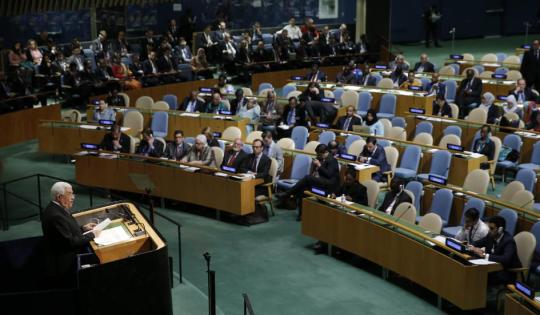Again, better late, than never, right?
This time, I am moving forward with the spearkers of the second half of the general debate.

I was pleasantly surprised by the speech of President Kolinda Grabar-Kitarovic of Croatia, it almost consoled me for the absence of the British Prime Minister, she is such a good speaker. I wanted to follow her speech of course for the Croatia’s involvement in the European refugee situation. In solving this crisis, she emphasized that we will have to find balance between national, regional and global interests.
Palestinian President Mahmoud Abbas elaborated on the Palestinian issue in his speech. Claiming that negotiations have proved to be useless, he declaired that Palestine cannot be bound by the agreements dealing with the issue until Israel continues to violate them.
President Tomislav Nikolic of Serbia made some good points about climate change, but his remarks on the refugee crisis were more of interest for me, as his country is heavily affected by it. Without naming names he dissed the Hungarian government’s actions as breaches of the 1951 Refugee Convention, calling the fence building practice the “ghettoizing” of the asylum-seekers.
Slovenia is another Eastern-European country that is affected, Prime Minister Miro Cerar also touched upon the refugee issue by stressing the importance of solving the root of the problem and reaching a sustainable political solution for the conflict that causes people to flee their homes.
Greek Prime Minister Alexis Tsipras also reflected on the burden the refugee crisis put on his country that was already in a difficult situation. He stressed that despite its economic hardship Greece showed humanty towards those in need, and urged others to follow example. He also called on a diplomatic solution mentioning not just the Middle-East as the major region of origin of asylum-seekers, but also Ukraine and Libya.
Israeli Prime Minister Benjamin Netanyahu has spent more than double of his allowed speaking time with what Israel considers the most important issues, the threat of Iran and the peace process with Palestine, the failing of which of course he blames on the other party. Probably everyone heard about the one minute pause during the speech. Although I oppose using nicknames in diplomacy, I must say Bibi would not be Bibi if he didn’t pull a performance like that. I’d imagine I would have felt awkward if I was there listening, but the public didn’t seem to mind at all.
I had expected more on the migration issue from the representative of Slovakia, Deputy Prime Minister for Foreign and European Affairs, Miroslav Lajcak, as Slovakia is as resentful about accepting refugees as Hungary is. He made some rather soft statements about the need of the cooperation between states and finding a sustainable solution to the rood causes of the crisis.
Germany was also represented on a ministerial level, Minister of Foreign Affairs Frank-Walter Steinmeier stressed that his country cannot cope with the refugee situation alone on the long run, without a joint plan for cooperation in Europe. He called the underfundanding of relief agencies “scandalous”, and after touching upon other current crises around the world he stated Germany’s view that the situation in Syria can only be solved by ending the present “dictatorship”.
Sebastian Kurz, Federal Minister for Europe, Integration and Foreign Affairs of Austria, also streesed that making peace in Syria is only doable without the current political leadership. He expressed his country’s view that for the sake of solving crises like this, there should be more unity, and the US and Russia should be able to work together. For solving the refugee crisis, he said a new global asylum policy should be introduced where asylum seekers would not have to risk their lives for a chance to live in peace.
The Syrian Arab Republic was represented by Deputy Prime Minister and Minister for Foreign Affairs and Expatriates, Walid Al-Moualem. He said that his country is also in favour of a political solution, but based on the speech, they understand the political solution quite differently to countries of the West. Quite interestingly he blamed the spread of terrorism in Syria on that 100 countries from which ISIS supporters are coming from according to UN data, and said that it is the duty of the international community to stop the flow of terrorists to Syria, in order to stop the flow of refugees out of Syria. Quite an interesting way of thinking. Besides touching upon the problems of the Middle East, he congratulated Cuba on the lifting of economic embargoes, and called to lift sanctions on all other countries, including his own.
Hungary’s Minister for Foreign Affairs and Trade Péter Szijjártó spoke on the last day of the general debate. He repeated the Hungarian government’s often stated view that there is no refugee crisis, the people flowing in to Europe are “economic migrants”. He claimed that a series of bad international political moves lead to the destabliziation of the Middle East, and if the international community doesn’t take urgent action, it will result in the destabilization of Europe as well. He stressed the need to introduce a global quota system to handle the situation.
After the last speaker left the podium, Mogens Lykketoft, President of the General Assembly concluded the general debate, noting that this year more countries were represented by heads of state/government level than ever. This of course can be accounted for the 70th anniversary, as well as the accompanying summits that were just as important as the debate itself.
Picture source: www.newsweek.com
For more information and videos: http://gadebate.un.org/

